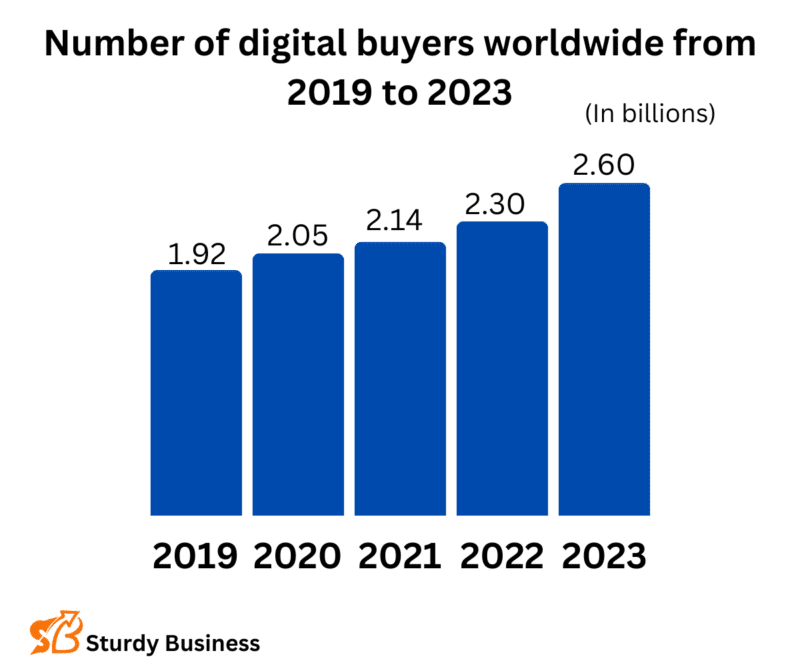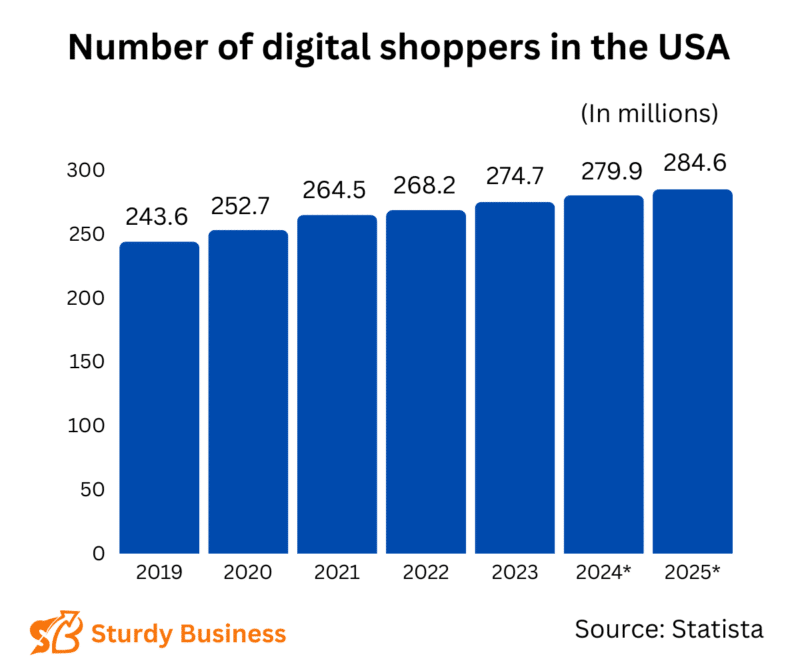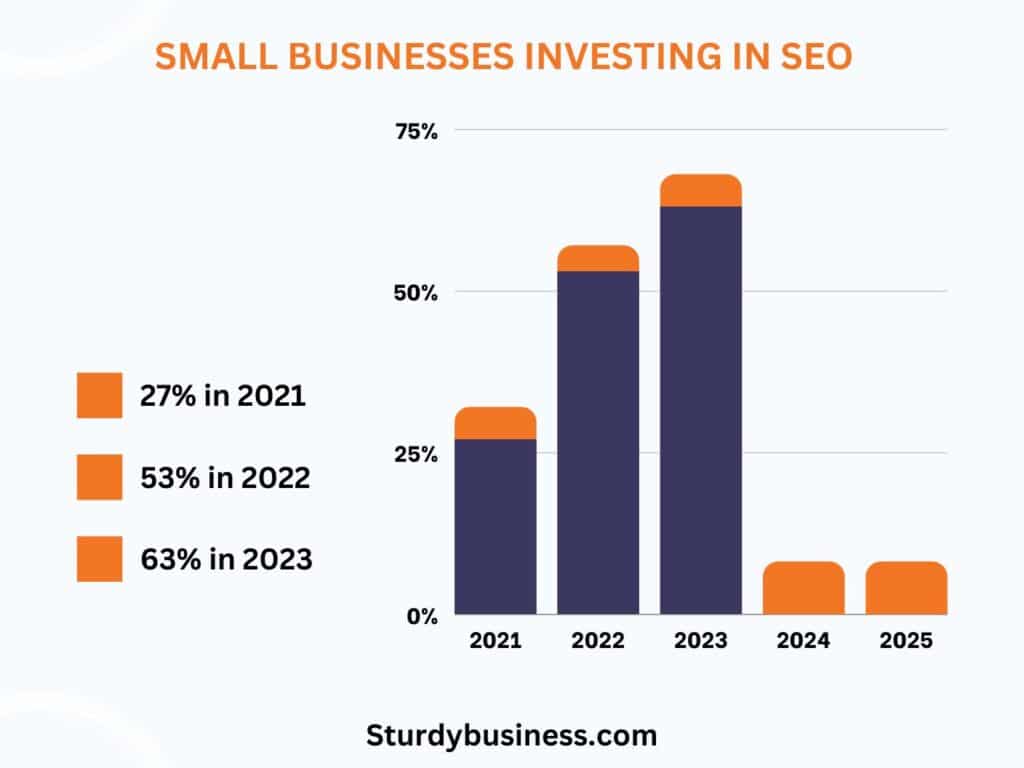If you have a retail business, these stats may be interesting for you as they help you understand the importance of digital marketing for retail businesses.
Looking at the statistics, it’s a no-brainer that over the past few years, especially after 2019, there has been an increase in the number of people using digital methods to shop, and this has had a significant impact on stores.

So, it became a necessity for stores to leverage digital marketing in order to target those customers and stay ahead of the competition.
They realized that as things have changed, in order to be remembered by customers, stay relevant, and remain competitive, they have to use digital marketing.
The latest figures indicate that many Americans purchase items on the Internet, with approximately 70% of them making online purchases. Another interesting statistic is that over 25% buy online every single month.

This equates to around $6.57 trillion US dollars or 22% of global retail sales made through e-commerce in 2023. It therefore makes business sense for any retail enterprise that wants to do well and prosper to capitalize on this trend.
Among many other ways, one good starting point could be having a good digital marketing plan.
Digital marketing provides opportunities for stores and retailers should seize on these chances presented by digital marketing and go where their target audience is most found.
I believe these statistics are sufficient to help you understand the importance of digital marketing for retail businesses. However, we can delve deeper to explain why you must leverage digital marketing for your retail business. Which digital marketing strategies you should prioritize and what are irresistible benefits.
On this page
Which marketing strategy is most effective for my retail business?
How people buy from and engage with retailers has changed completely. However, the way many retailers market to their target customers remains the same.
Customers are spending additional time on the Internet all the time. As a matter of fact, 87% of consumers start their product searches on the web!
It’s interesting to note that over 93% of consumers find local businesses online. So, if you are not online; you are missing a large audience.
This is why having an online presence has become obligatory, irrespective of what you sell.
To boost in-store traffic and sales, it may thus be essential to embrace digital marketing in your business plan.
However, we need to delve into individual strategies a little.
What is traditional marketing?
Traditional marketing is defined as the use of traditional media to reach a large population. It encompasses four primary categories:
- Direct Mail
- Print Ads
- Telemarketing
- Broadcast media
All these are outbound marketing strategies. Traditional advertising involves interrupting people to get their attention.
What is digital marketing?
Digital marketing, on the other hand, means using online tools to market relevantly to prospective consumers. They include:
- Email Marketing
- Social Media Marketing: Twitter, Facebook, Instagram, LinkedIn, etc.
- SEO (Search Engine Optimization)
- SEM (Search Engine Marketing) and PPC (Pay Per Click) Advertising
- Content Marketing
In digital marketing, most of them especially, SEO is inbound marketing. It means, you target customers when they need your services or products.
So, instead of interruption, digital advertising focuses on delivering helpful information when target consumers are seeking it out at that particular moment.
What are the benefits of digital marketing over traditional means of marketing?
Here are the benefits of leveraging digital marketing for retail businesses.
Easily track marketing campaigns:
Traditional marketing methods are hard to track. For instance, how can you know how many people saw your newspaper or magazine advertisement in a day? Or how many customers were attracted by it?
This means that traditional marketing is hard to measure, and you will not understand if you are using the budget properly.
Unlike traditional marketing, digital marketing has advanced analytics capabilities that enable you to measure results. These include:
- The number reach people who have seen your content.
- Demographics and geographic locations of the people reached.
- Conversion rates like an actual sale, a completed download, a subscriber, etc. Also, how long, on average, people stay on your page and when they leave after viewing your content.
- Bounce rate (the percentage of visitors to your website that left after only seeing one page).
- Email open rate (percentage of recipients who opened your e-mail).
- Click-Through-Rate (CTR) (percentage of shoppers who clicked on the link included in your advertisement).
You can see from this that digital marketing gives real-time data that is very useful.
You just click on which method isn’t working for you and which ones have been able to give you results, thus allowing you to make changes for better campaign results.
Right consumer targeting:
One of the most important digital marketing advantages is its ability to reach a specific person at the perfect moment through adequate channels.
For instance, as a retailer, you can leverage digital marketing to focus your efforts on the channels where your customers are planning their purchases and to interact with them throughout their shopping journey.
It is possible for marketers to direct specifically targeted ads based on online behavior and geo-profiling to people who are interested in making purchases.
That is how retailers get hyper segmentation using digital marketing. Marketers can target an audience that has shown interest in buying by analyzing their online behavior and geographical features.
On the other hand, there are retailers that have similar audiences in terms of looking and surfing for their competitor’s products or services offered online.
Personalized communication:
If you are a business owner, I want to let you in on a little secret: in order to connect with your customers, use personalization.
How?
Digital marketing is capable of collecting information about people’s preferences and desires.
There are many ways to collect such data, you can do online research or track everything while running ads. This data becomes your asset to run targeted campaighs.
Retail businesses using digital marketing use this data to create custom messages for each customer. Customers love it when your message seems like it is meant specifically for them.
And as a result, guess what comes next? Loyal customers!
In today’s world, there is an expectation for this kind of personalized touch. The businesses that get it right are the ones who make it big. When customers receive messages that suit their interests and needs, they are more likely to take heed.
But here’s the trick- ensure that both your message and your product matter to your customer. In the crowd of online stuff, you must stand out among others.
Personalized communication helps shops guide customers into buying at the right time and in appropriate contexts that fit well with their shopping journey.
Enhanced customer experience:
This is about personalizing each customer’s experience, thus making them feel special and making shopping easy. Firms can delve into customers’ data, analyze it to be able to create targeted advertising, recommend products this person may like, and so on.
Accenture says that 91% of consumers are more likely to shop with brands who know them, remember them as individuals, and offer tailored recommendations, deals, or discounts.
Affordable marketing and advertising:
Digital marketing is a cheaper way to advertise compared to traditional methods, and it gives better results. For instance, studies show that car dealerships save up to 90% on digital marketing.
Social media marketing, SEO strategies, emails, and content marketing are among the many online tools retailers can use to engage customers and market the products they sell.
Moreover, online ads can target specific groups hence allowing for smart spending on ads as well as displaying them correctly at the precise moment.
Good return on investment (ROI):
You can track the progress of your daily advertising plan on the net, thus enabling you to tell which channels are successful and which are not. This will enable you to fine-tune your campaign budgets for enhanced return on investment (ROI).
It is widely known that online advertising and marketing have a higher ROI.
For example, email marketing generally boasts a high ROI (around 3,600%), while SEO might average around 22:1.
But it all depends on what you do. It’s possible that for your retail business, you will get better ROI with SEO.
If you are interested in SEO services, you can contact us at, [email protected].
Helps you differentiate yourself from other competitors:

In case you didn’t know, trust us when we say that your competition is already utilizing effective digital marketing strategies to enhance their businesses.
Therefore, if you haven’t started doing it yet, then it’s important that you begin now.
For companies, there are many reasons why digital marketing is necessary and one of them is to stay ahead of the competitors.
It’s always good to keep up with what your competitors are doing and assess how best to do them differently from yours. Eventually, all you want is a better strategy for digital marketing with more website traffic driven into your brand and an even bigger customer base attracted.
Value vs. Interruption
Traditional methods of advertising interrupt people so that they look at advertisements. This is why most people dislike receiving sales flyers or inconvenient phone calls because they don’t feel authentic.
People don’t buy what sales ads tell them. They see hundreds of them each day and have become accustomed to ignoring them.
Shoppers nowadays seek valuable and informative content to help them make informed buying decisions. These include product reviews, blogs, and informative videos.
With digital marketing, you do not need to fight for the attention of shoppers because you already have it!